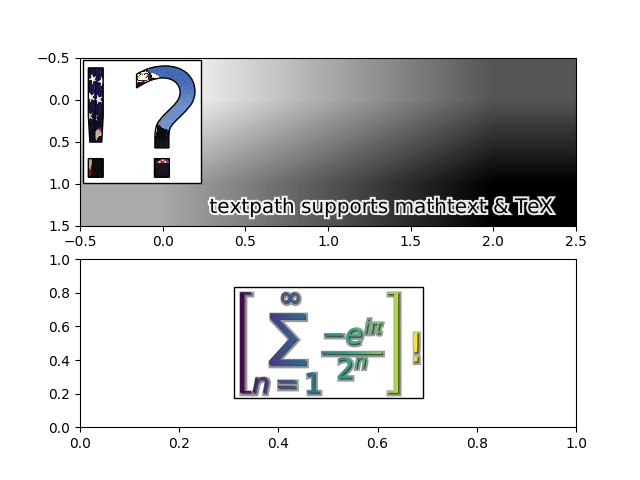Version 3.1.3
Note
Click here to download the full example code
Use a text as Path. The tool that allows for such conversion is a
TextPath. The resulting path can be employed
e.g. as a clip path for an image.

import matplotlib.pyplot as plt
from matplotlib.image import BboxImage
import numpy as np
from matplotlib.transforms import IdentityTransform
import matplotlib.patches as mpatches
from matplotlib.offsetbox import AnnotationBbox,\
AnchoredOffsetbox, AuxTransformBox
from matplotlib.cbook import get_sample_data
from matplotlib.text import TextPath
class PathClippedImagePatch(mpatches.PathPatch):
"""
The given image is used to draw the face of the patch. Internally,
it uses BboxImage whose clippath set to the path of the patch.
FIXME : The result is currently dpi dependent.
"""
def __init__(self, path, bbox_image, **kwargs):
mpatches.PathPatch.__init__(self, path, **kwargs)
self._init_bbox_image(bbox_image)
def set_facecolor(self, color):
"""simply ignore facecolor"""
mpatches.PathPatch.set_facecolor(self, "none")
def _init_bbox_image(self, im):
bbox_image = BboxImage(self.get_window_extent,
norm=None,
origin=None,
)
bbox_image.set_transform(IdentityTransform())
bbox_image.set_data(im)
self.bbox_image = bbox_image
def draw(self, renderer=None):
# the clip path must be updated every draw. any solution? -JJ
self.bbox_image.set_clip_path(self._path, self.get_transform())
self.bbox_image.draw(renderer)
mpatches.PathPatch.draw(self, renderer)
if __name__ == "__main__":
usetex = plt.rcParams["text.usetex"]
fig = plt.figure()
# EXAMPLE 1
ax = plt.subplot(211)
arr = plt.imread(get_sample_data("grace_hopper.png"))
text_path = TextPath((0, 0), "!?", size=150)
p = PathClippedImagePatch(text_path, arr, ec="k",
transform=IdentityTransform())
# p.set_clip_on(False)
# make offset box
offsetbox = AuxTransformBox(IdentityTransform())
offsetbox.add_artist(p)
# make anchored offset box
ao = AnchoredOffsetbox(loc='upper left', child=offsetbox, frameon=True,
borderpad=0.2)
ax.add_artist(ao)
# another text
from matplotlib.patches import PathPatch
if usetex:
r = r"\mbox{textpath supports mathtext \& \TeX}"
else:
r = r"textpath supports mathtext & TeX"
text_path = TextPath((0, 0), r,
size=20, usetex=usetex)
p1 = PathPatch(text_path, ec="w", lw=3, fc="w", alpha=0.9,
transform=IdentityTransform())
p2 = PathPatch(text_path, ec="none", fc="k",
transform=IdentityTransform())
offsetbox2 = AuxTransformBox(IdentityTransform())
offsetbox2.add_artist(p1)
offsetbox2.add_artist(p2)
ab = AnnotationBbox(offsetbox2, (0.95, 0.05),
xycoords='axes fraction',
boxcoords="offset points",
box_alignment=(1., 0.),
frameon=False
)
ax.add_artist(ab)
ax.imshow([[0, 1, 2], [1, 2, 3]], cmap=plt.cm.gist_gray_r,
interpolation="bilinear",
aspect="auto")
# EXAMPLE 2
ax = plt.subplot(212)
arr = np.arange(256).reshape(1, 256)/256.
if usetex:
s = (r"$\displaystyle\left[\sum_{n=1}^\infty"
r"\frac{-e^{i\pi}}{2^n}\right]$!")
else:
s = r"$\left[\sum_{n=1}^\infty\frac{-e^{i\pi}}{2^n}\right]$!"
text_path = TextPath((0, 0), s, size=40, usetex=usetex)
text_patch = PathClippedImagePatch(text_path, arr, ec="none",
transform=IdentityTransform())
shadow1 = mpatches.Shadow(text_patch, 1, -1,
props=dict(fc="none", ec="0.6", lw=3))
shadow2 = mpatches.Shadow(text_patch, 1, -1,
props=dict(fc="0.3", ec="none"))
# make offset box
offsetbox = AuxTransformBox(IdentityTransform())
offsetbox.add_artist(shadow1)
offsetbox.add_artist(shadow2)
offsetbox.add_artist(text_patch)
# place the anchored offset box using AnnotationBbox
ab = AnnotationBbox(offsetbox, (0.5, 0.5),
xycoords='data',
boxcoords="offset points",
box_alignment=(0.5, 0.5),
)
# text_path.set_size(10)
ax.add_artist(ab)
ax.set_xlim(0, 1)
ax.set_ylim(0, 1)
plt.show()
Keywords: matplotlib code example, codex, python plot, pyplot Gallery generated by Sphinx-Gallery